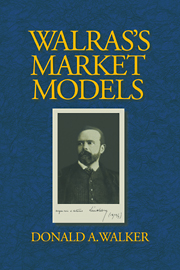Book contents
- Frontmatter
- Contents
- List of figures
- Preface
- Acknowledgments
- Introduction
- Part I The models of the mature phase
- 1 Walras's conception of a competitive market economy
- 2 The mature models: Not a normative scheme
- 3 The mature models of the barter of stocks of commodities
- 4 Institutions and participants in the model of monetary oral pledges markets
- 5 Disequilibrium and equilibrium in the model of monetary oral pledges markets
- 6 The structure of the mature nondurable consumer commodities model
- 7 The equilibrating processes in the mature nondurable consumer commodities model
- 8 The structure of the mature comprehensive model
- 9 The equilibrating processes in the mature comprehensive model
- 10 Walras and his critics on the maximum utility of new capital goods
- 11 The mature models of the money market
- 12 Iteration in the mature model of tatonnement
- 13 The mature model of the behavior of the entrepreneur
- 14 Walras versus Edgeworth on tatonnement processes
- Part II The models of the phase of decline
- References
- Collation of editions of the Eléments
- Index
9 - The equilibrating processes in the mature comprehensive model
Published online by Cambridge University Press: 05 May 2010
- Frontmatter
- Contents
- List of figures
- Preface
- Acknowledgments
- Introduction
- Part I The models of the mature phase
- 1 Walras's conception of a competitive market economy
- 2 The mature models: Not a normative scheme
- 3 The mature models of the barter of stocks of commodities
- 4 Institutions and participants in the model of monetary oral pledges markets
- 5 Disequilibrium and equilibrium in the model of monetary oral pledges markets
- 6 The structure of the mature nondurable consumer commodities model
- 7 The equilibrating processes in the mature nondurable consumer commodities model
- 8 The structure of the mature comprehensive model
- 9 The equilibrating processes in the mature comprehensive model
- 10 Walras and his critics on the maximum utility of new capital goods
- 11 The mature models of the money market
- 12 Iteration in the mature model of tatonnement
- 13 The mature model of the behavior of the entrepreneur
- 14 Walras versus Edgeworth on tatonnement processes
- Part II The models of the phase of decline
- References
- Collation of editions of the Eléments
- Index
Summary
This chapter is concerned with aspects of the second stage of Walras's mature comprehensive model. He developed the second stage by assuming the existence of inventories and by explicitly considering money balances. The chapter investigates the equilibrating processes in the markets, showing that the model is characterized by disequilibrium production and sales of all types of commodities. It examines the conditions of the variables in general equilibrium. Finally, it assesses the capacity of Walras's equation system to identify the equilibrium values of the variables in his model.
Introduction
This chapter continues the examination of the mature comprehensive model. The first concern is to identify the structural properties of the second stage of the model, which Walras presented, like the first, in the lessons of the Eléments that also deal with new capital goods. It is shown how Walras began by identifying the components of national wealth, and then introduced business and consumer inventories and made explicit some features of the holding of money balances. The chapter goes on to examine the actions of the participants in the markets and the dynamic behavior of the variables, with particular attention to the market for new capital goods. In dealing with the behavior of the model in disequilibrium, it shows the reconciliation of two seemingly contradictory phenomena: the occurrence of trade only at equilibrium prices during the adjustment process, and the fact that the model is not in equilibrium at those prices.
- Type
- Chapter
- Information
- Walras's Market Models , pp. 181 - 207Publisher: Cambridge University PressPrint publication year: 1996



